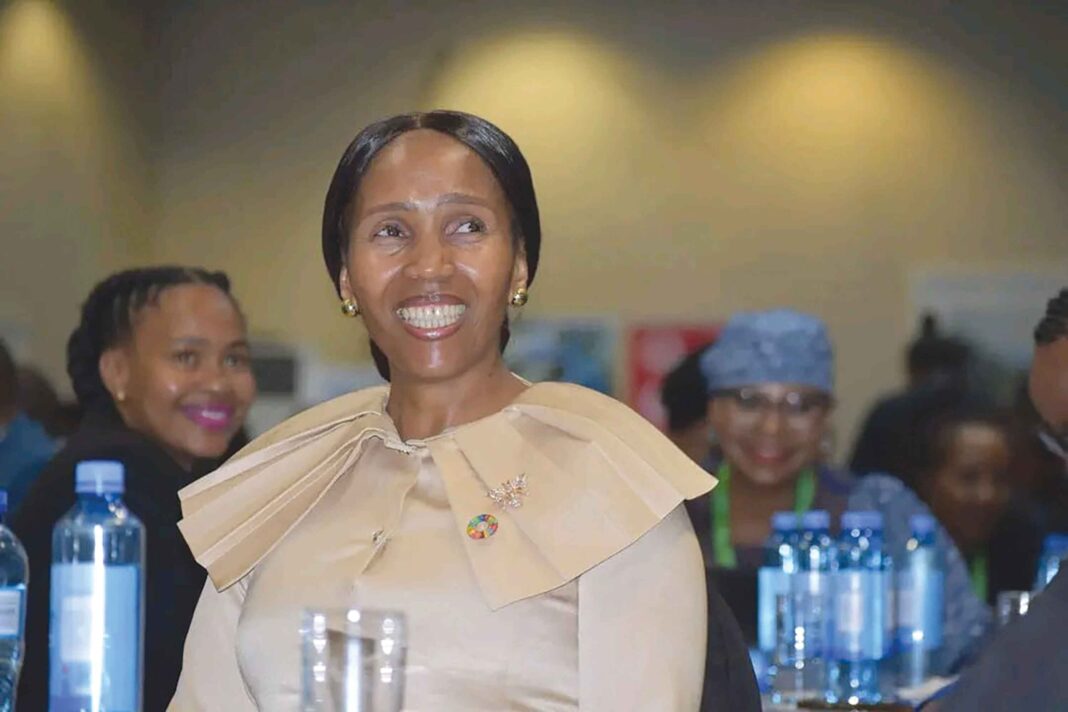Ntsoaki Motaung
Her Majesty Queen ‘Masenate Mohato Seeiso, speaking at the Southern Africa Regional Early Childhood Development and Education Conference (SARECDEC) 2024 this week, highlighted the critical importance of technology-based and climate-resilient Early Childhood Development and Education (ECDE) systems.
She emphasised that in the 21st century, technology has become an integral part of everyday life, making it essential to incorporate tech-driven and climate-conscious ECDE systems.
Her Majesty noted that technology can significantly enhance the reach and effectiveness of early childhood services, particularly in rural and underserved communities. She urged all stakeholders to harness these tools to deliver quality education at an early age and provide support to all children.
The SARECDEC, held in Lesotho under the theme “Beyond Bricks and Mortar: Investing in Our Most Valuable Asset—Building Blocks for the Future,” is organised by the Network of Early Childhood Development of Lesotho (NECDOL).
Her Majesty further urged all stakeholders concerned with the rights and welfare of children to explore the potential of the private sector in complementing public investments.
“It truly takes a village to raise a child, and we must embrace shared responsibility, collective action, and innovative approaches to nurture our children and their families. As we embark on this journey together, let us also prioritize inclusivity. Every child, regardless of their background, ability, or circumstance, deserves access to quality early childhood education. We must advocate for policies that dismantle barriers and promote equitable opportunities for all children,” she said.
Professor Beatrice Matafwali from Zambia highlighted that approximately 3.9 million children are at risk of malnutrition due to the impacts of climate change.
“Looking at the implications of climate change, I urge us to reflect on the Nurturing Care Framework. Since its launch in 2018, countries have made significant strides in improving access to health, nutrition, learning opportunities, and responsive caregiving,” she said.
However, she pointed out that climate change presents new risks, such as exposure to poor water quality, damage to education and healthcare infrastructure, and heightened pollution levels. “The floods, heatwaves, and food insecurity we’ve experienced are reversing some of the progress made in combating malnutrition,” she added.
Professor Matafwali further stressed that the destruction of educational institutions, particularly early childhood centers, and the limited access to essential services are contributing to disruptions in learning opportunities. “These challenges are affecting all sectors of education, including Early Childhood Development (ECD),” she said.
On behalf of the Prime Minister, the Minister in the Prime Minister’s Office, Limpho Tau, emphasized that investing in the development of the English language is not only a moral imperative but also an economic one. He stated that by prioritizing the formative years of children, the nation is investing in future leaders, thinkers, and innovators.
“We can create a nurturing environment that fosters growth and development by equipping our children with the skills and resilience they need to navigate the challenges of tomorrow,” he said.
The Minister of Education and Training, Professor Ntoi Rapapa, added that investing in children must extend beyond physical infrastructure, emphasizing the importance of creating natural environments where every child can thrive—safe, well-fed, and given opportunities to grow and succeed.
“For increased investment in Early Childhood Development Education (ECDE), we have made a firm commitment to raise our budget allocation for early childhood education from the current 0.5 percent to 2.5 percent in the coming years,” he announced. He further indicated that this significant increase would expand access to quality early learning opportunities.
Deepak Bhaskaran, the UNICEF Representative in Lesotho, reinforced that investing in ECDE is not an option but an obligation if the world hopes to have future generations that can thrive. “Without decisive action, we risk failing to build a resilient, capable, and skilled workforce that is essential for sustainable growth,” he said.
Bhaskaran also stressed that to equip children for the modern workforce, teachers must be trained to use technology. “These tools are not just a substitute for traditional learning but are complementary tools that enrich lessons and stimulate young minds,” he concluded.
Summary
- On behalf of the Prime Minister, the Minister in the Prime Minister’s Office, Limpho Tau, emphasized that investing in the development of the English language is not only a moral imperative but also an economic one.
- The Minister of Education and Training, Professor Ntoi Rapapa, added that investing in children must extend beyond physical infrastructure, emphasizing the importance of creating natural environments where every child can thrive—safe, well-fed, and given opportunities to grow and succeed.
- Deepak Bhaskaran, the UNICEF Representative in Lesotho, reinforced that investing in ECDE is not an option but an obligation if the world hopes to have future generations that can thrive.

Your Trusted Source for News and Insights in Lesotho!
At Newsday Media, we are passionate about delivering accurate, timely, and engaging news and multimedia content to our diverse audience. Founded with the vision of revolutionizing the media landscape in Lesotho, we have grown into a leading hybrid media company that blends traditional journalism with innovative digital platforms.






